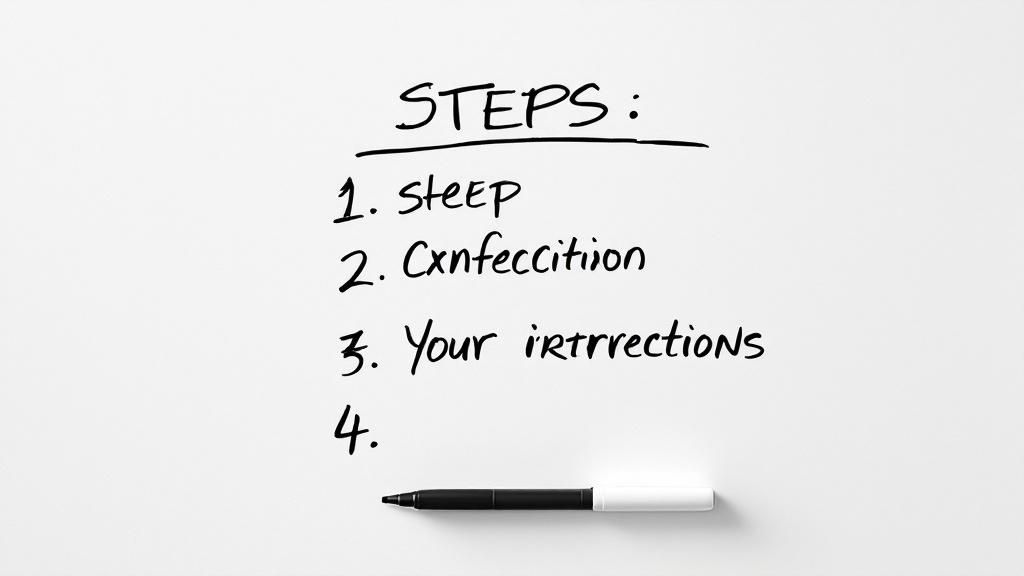Ever wondered what happens when your favourite local café gets a new owner, but everything else—the friendly staff, the familiar menu, the cosy atmosphere—stays exactly the same? This is a perfect real-world example of what Dutch law calls an overgang van onderneming, or a transfer of undertaking.
In legal terms, this means that when a business changes hands, the employees' jobs and working conditions are automatically protected and move with the business to the new owner.
Understanding a Business Transfer in the Netherlands

An overgang van onderneming is a specific legal event where an economic entity, like a company or a distinct part of one, is transferred to a new employer. For the law to apply, the business must keep its core identity after the transfer and continue its operations in a similar way.
This is much more than just a simple sale of assets like computers or machinery. It’s about the transfer of an entire operational business. The easiest way to think about it is that the new employer literally steps into the shoes of the old one. This legal framework, which comes from European directives and is written into the Dutch Civil Code, acts as a strong safety net for employees caught in the middle of a takeover.
Key Protections for Employees
The law is clear: employees shouldn't lose their jobs or be forced into worse conditions just because their company has a new boss. The fundamental protections are quite robust:
- Automatic Transfer of Employment: All existing employment contracts automatically move from the seller (the transferor) to the buyer (the transferee). Employees don't need to sign new contracts for their employment to continue.
- Preservation of Rights and Obligations: Every term and condition from the original employment contract stays firmly in place. This includes salary, seniority, holiday entitlements, pension rights, and any other established benefits.
- Protection Against Dismissal: The transfer itself can never be a valid reason for dismissal. An employee’s job is secure unless there are separate economic, technical, or organisational reasons for redundancy that would have existed regardless of the transfer.
Crucial Takeaway: The primary goal of the law governing an overgang van onderneming is to ensure stability for the workforce. The idea is that employees should experience a seamless transition, with their legal and contractual rights fully preserved under the new ownership.
For business owners, understanding these rules is absolutely vital for compliance. For employees, it provides essential peace of mind during what can be an uncertain time. Both the seller and the buyer share responsibility for managing the process correctly. The seller must give the buyer all the necessary information, and the buyer must be ready to honour all existing employment obligations from the moment the deal is done.
Quick Overview of Business Transfers in the Netherlands
To help you grasp the basics at a glance, the table below summarises the fundamental aspects of a transfer of undertaking under Dutch law.
| Aspect | Brief Explanation |
|---|---|
| Core Concept | An economic entity (a business or part of one) is transferred while keeping its identity. |
| Employee Status | Employment contracts automatically transfer to the new employer by law. |
| Working Conditions | All existing rights and obligations (salary, holiday, etc.) are fully preserved. |
| Dismissal Protection | The transfer itself is not a lawful ground for terminating employment. |
| Key Principle | The new employer "steps into the shoes" of the old employer, inheriting all obligations. |
This framework ensures that business transfers happen smoothly without unfairly disadvantaging the people who make the business run: the employees.
How Courts Identify a Business Transfer

Figuring out if a transaction is truly an overgang van onderneming isn't always as simple as it looks. It goes far beyond just a change of ownership on paper. Courts dig much deeper to see if the real heart of the business—its economic identity—is still intact after the deal is done.
This isn't a mechanical checklist where ticking off a few boxes gives you a clear answer. Instead, Dutch and European courts take a holistic view, weighing several interconnected factors to see the whole picture. These guiding principles are famously known as the Spijkers criteria, named after a landmark ruling by the European Court of Justice.
At the end of the day, the core question is always this: has an operating economic entity been transferred in a way that it keeps its identity, allowing the new owner to carry on with the same or very similar business activities?
The Core Principle: Identity Preservation
The absolute key element here is identity preservation. A good analogy is a local football club changing owners. If the team keeps its players, its name, its stadium, and keeps playing in the same league, it's still recognisably the same club. Its identity has been preserved, even with a new person at the top.
A simple sale of assets, like offloading old office furniture and computers, doesn't even come close. That’s just liquidation. An overgang van onderneming involves the transfer of a living, breathing business operation.
Breaking Down the Spijkers Criteria
To decide if a business has kept its identity, courts look at all the facts and circumstances surrounding the transaction. The Spijkers criteria offer a solid framework for this analysis, zeroing in on several key factual elements.
Here are the main factors that go into the mix:
- The Nature of the Business: Is it a people-powered business (like a consultancy firm) or one driven by assets (like a factory)? This starting point heavily influences how other factors are weighed.
- Transfer of Tangible Assets: Were physical assets like buildings, machinery, or stock part of the deal? In a manufacturing setting, the transfer of machinery is a massive indicator.
- Transfer of Intangible Assets: Did valuable non-physical assets like brand names, customer lists, permits, or intellectual property change hands?
- Takeover of Staff: Did the new employer take on a significant chunk of the workforce, especially the key people? In a service business, this is often the most critical factor of all.
- Transfer of Customers: Has the new owner inherited the existing client base or contracts?
- Similarity of Activities: How similar are the business activities before and after the transfer? If a bakery is sold and continues to operate as a bakery, it’s a strong signal.
- Duration of Interruption: Did the business stop operating for any length of time? A short, temporary pause for purely logistical reasons usually isn’t a deal-breaker.
Key Insight: No single factor ever decides the case on its own. A court will always weigh all the elements together. For example, with a cleaning company, taking over the employees is paramount, while the mops and buckets are far less important. In contrast, for a highly automated factory, the transfer of the machinery could be the deciding factor, even if very few staff are taken on.
This comprehensive assessment ensures the law is applied based on the reality of the situation, not just the formal legal structure of the deal. The strong business climate in the Netherlands often encourages these kinds of transfers as a path to growth. In fact, a recent survey revealed that over 70% of Swedish companies in the Netherlands expect their turnover to grow, pointing to a dynamic market where business transfers are common. This really underlines how vital it is for both local and international companies to get these legal details right. You can find out more about the Dutch business outlook in the Business Climate Survey 2025.
Understanding Your Rights as an Employee

When the business you work for changes hands, it’s completely natural to feel a bit of uncertainty. Thankfully, Dutch law offers a strong shield for employees through a crucial legal concept: the automatic transfer principle. This is, without a doubt, the most important protection you have during an overgang van onderneming.
The easiest way to think about it is that your employment contract is securely attached to the business. When the business is sold to a new owner, your contract—with all its rights and benefits—automatically goes with it. You don’t have to lift a finger; the law ensures this transfer happens seamlessly.
Essentially, the new employer (the transferee) legally steps into the shoes of your old employer (the transferor). This means they inherit your employment contract exactly as it is, with every specific term and condition intact.
The Automatic Transfer of Your Employment Contract
This automatic transfer principle isn’t just a friendly suggestion; it’s a hard-and-fast rule. It guarantees that every right and obligation from your original employment agreement remains fully in place after the overgang van onderneming is finalised.
The scope of this protection is incredibly broad, covering all the vital elements of your employment that you've built up over time. Some of the key protected conditions include:
- Your Salary: The new employer is legally required to continue paying your agreed-upon wage without any changes.
- Job Title and Function: Your role and core responsibilities should stay the same.
- Seniority: Every year you've worked for the company counts towards your seniority with the new owner. This is critical for things like jubilee celebrations, notice periods, and any potential redundancy calculations down the line.
- Holiday Entitlement: Your accrued and future holiday days are protected and transfer over.
- Other Benefits: This covers any contractual perks, from bonuses and a company car to expense allowances.
From your point of view, the day after the transfer should feel no different from the day before when it comes to your contractual rights.
Key Protection: The most fundamental right you have is that the overgang van onderneming itself can never be a valid legal reason for dismissal. An employer cannot fire you simply because the company was sold.
This provides a vital layer of job security. While dismissals for other legitimate economic, technical, or organisational reasons might still be possible later, the transfer event itself is completely off-limits as a justification for termination. For a deeper dive into this topic, you can learn more about the complexities of Netherlands employment law in our detailed guide.
What Happens to Collective Labour Agreements
If a Collective Labour Agreement (CAO) governs your employment, the protections extend even further. The new employer is legally bound to respect the terms of the seller's CAO for all employees who are part of the transfer.
Think of the CAO as the official rulebook for your industry or company. The new owner must play by that same rulebook until one of three things occurs:
- The existing CAO's term expires.
- The new employer becomes bound by a new CAO that covers your role.
- The new employer’s own pre-existing CAO becomes applicable.
A crucial point, recently confirmed by a Dutch Supreme Court ruling in July 2024, is that if your contract has a "dynamic incorporation clause"—one that refers to future versions of the CAO—the new employer must also honour these future agreements. They can't just ask you to sign this right away as part of the transfer.
This is significant. It means you remain covered by wage increases and updated conditions negotiated by the union, even under new ownership. This provides long-term stability and stops a new employer from immediately trying to undercut established labour standards. Your rights aren't frozen in time; they continue to evolve with the CAO that has always applied to you.
What Employers Must Do During a Transfer

When a business changes hands, it’s far more than a simple financial transaction. It's a complex legal process where both the selling employer (the transferor) and the buying employer (the transferee) have strict legal duties. Getting this right requires careful, proactive management from both sides to ensure a smooth transition and avoid nasty legal surprises down the road.
One of the most powerful legal safety nets for employees in this situation is the concept of joint and several liability. Think of it as a shared responsibility. For one year after the transfer date, both the old and new employers are on the hook together for any obligations that existed before the sale was finalised.
So, if the original employer forgot to pay a bonus that was due before the transfer, the employee has every right to chase that payment from either the old employer or the new one. This puts real pressure on the buyer to perform thorough due diligence and on the seller to tidy up their affairs properly, ensuring employees aren't left out of pocket.
The Duty to Inform and Consult
Transparency isn't just good form during an overgang van onderneming—it's the law. Both the seller and the buyer have a legal duty to inform and consult with their employees or their representatives about the upcoming transfer. The whole point is to provide clarity, manage expectations, and give the workforce a voice in a process that directly affects them.
This process becomes quite formal if the company has a works council (Ondernemingsraad or OR).
- Works Council Involvement: Both employers must formally ask their works councils for advice on the proposed transfer and what it will mean for staff. This request needs to be made early enough for the council's feedback to actually influence the final decision.
- Direct Employee Information: For companies without a works council, the employer is obligated to inform all affected employees directly. This information needs to be clear, timely, and cover all the key details.
- Union Consultation: If a union is part of the picture, it must also be consulted as laid out in the relevant Collective Labour Agreement (CAO).
The information shared can’t be vague. It must include the planned date of the transfer, the reasons behind it, and a clear outline of the legal, economic, and social consequences for employees. Any planned changes to job roles or locations must also be detailed. Failing to get this right can lead to legal challenges that might delay or even stop the entire deal.
Key Employer Obligation: The duty to inform is a structured dialogue, not a one-way announcement. Employers are legally required to genuinely consider the advice they receive from the works council and must explain their reasoning if they decide not to follow it.
The rules around overgang van onderneming are interpreted broadly, and they can apply in situations you might not expect. For example, in a recent case on 11 July 2024, a Dutch Court of Appeal looked at a business reorganisation where a company moved to Switzerland. Even with valid business reasons for the move, the court decided that shifting assets, liabilities, and 10 to 20 employees was, in fact, a transfer of undertaking in a tax context. You can explore more about these trends in Dutch transfer cases on Chambers.com.
Because an overgang van onderneming is designed to protect employees from being dismissed simply because of the transfer, employers have to tread very carefully. Any changes to the workforce must be for entirely separate and valid economic, technical, or organisational reasons. If you need a deeper dive into this topic, take a look at our guide on how to handle employee dismissal legally.
To navigate this process successfully, it's crucial for both parties to understand their specific obligations. The table below provides a clear comparison of these duties.
Key Obligations for Transferor vs. Transferee
| Responsibility | Transferor (Seller) | Transferee (Buyer) |
|---|---|---|
| Information & Consultation | Must inform and consult with their works council, unions, or employees about the transfer, its reasons, and consequences. | Must also inform and consult with their own works council or employees, especially regarding measures planned post-transfer. |
| Employee Rights | Ensures all employment contracts and conditions transfer seamlessly. Settles all pre-transfer obligations (e.g., wages, bonuses). | Inherits all employees with their existing contracts, seniority, and rights. Becomes the new employer. |
| Joint & Several Liability | Remains jointly liable with the transferee for one year for any employee-related debts that existed at the time of transfer. | Becomes jointly liable with the transferor for one year for all pre-existing employee obligations. |
| Pension Schemes | Obligations related to the company pension scheme may transfer, depending on the specifics of the scheme and agreements. | May need to continue the existing pension scheme or provide a comparable alternative. Must be carefully reviewed. |
| Works Council Relations | Must seek formal advice from their works council on the decision to transfer. | Must seek advice from their works council on the consequences of the integration and any planned measures. |
Ultimately, clear communication and a firm grasp of these legal duties are what separate a smooth, successful transfer from a messy, contentious one. Both the seller and buyer share the responsibility for making it work, not just for the business, but for the people who are central to it.
When Transfer of Undertaking Laws Do Not Apply
While the rules for an overgang van onderneming provide a strong safety net for employees, it’s crucial to realise they don't apply to every business transaction. Not all sales or reorganisations trigger these automatic protections. Understanding the exceptions is just as important as knowing the rules.
Distinguishing these scenarios is vital because the legal consequences—especially for employees—are completely different. If a transaction falls outside the scope of a business transfer, employee contracts do not automatically move to the new owner, and dismissal protections do not apply.
The Simple Asset Sale
The most common situation that is not a business transfer is a simple asset sale. Imagine a company decides to sell off its fleet of delivery vans, its office furniture, or a piece of machinery. In this case, only physical property is changing hands.
There is no transfer of an operational business entity that maintains its identity. The buyer is simply acquiring goods, not a functioning business with staff and ongoing activities. For employees, this means their employment relationship remains solely with the original employer, who may then need to reassign them or, if no other work is available, consider redundancy for economic reasons.
The Share Sale Distinction
Another key exception is a share sale. This can be confusing because it feels like the company has a new owner, which it does. However, from a legal perspective, the employer itself has not changed.
Think of it this way: the company is a separate legal person. In a share sale, only the ownership of that legal person changes hands.
- The Employing Entity: The company (the B.V. or N.V.) that signs employee paycheques remains the same entity.
- The Employment Contract: Since the employer has not changed, the employment contract remains in place with that same company. There is no "transfer" of the contract from one employer to another.
Because the legal employer stays constant, the specific laws on overgang van onderneming are not triggered. Employees simply continue their employment with the same company, albeit under new ownership.
The Bankruptcy Exception
Bankruptcy introduces a significant and complex exception to the rules. When a company is declared bankrupt, the primary goal of the court-appointed trustee (curator) is to settle debts with creditors. To achieve this, the automatic employee protections of a business transfer are deliberately set aside to make the bankrupt company's assets more attractive to potential buyers.
A buyer acquiring a business directly from a bankrupt estate is not obligated to take on the existing employees or honour their contracts. The trustee typically terminates all employment contracts, and the buyer can then choose to offer new contracts to some or all of the former staff, often on different terms.
However, this exception is not a loophole for planned reorganisations. If a business is deliberately pushed into bankruptcy to bypass employee rights and then immediately sold as a pre-arranged "pre-pack" deal, courts may rule that it was a fraudulent circumvention of the law. In such cases, they can declare that a valid overgang van onderneming did occur, reinstating full employee protections.
Understanding these distinctions is essential. For more detailed insights into specific transfer scenarios, you can read our comprehensive guide on the transfer of undertaking.
Answering Your Key Questions
We've covered the main framework of an overgang van onderneming, which is designed to bring clarity and protection during a business sale. But of course, it's the personal, practical situations that often raise the most pressing questions for everyone involved. Let's tackle some of the most common concerns we hear from employees and employers.
What Happens to My Pension Rights in a Business Transfer?
Pension rights are a famously complex exception to the rule. While your core employment terms are protected and transfer over, the new employer isn't automatically forced to adopt the seller's exact pension scheme.
Instead, the new owner can bring you into their own company pension scheme. They can't just leave you without any pension at all, of course. Any replacement scheme must be legally sound and is often expected to be of a comparable standard, but the specifics can vary wildly.
It is absolutely crucial to get specific advice on how your pension will be affected. The outcome depends heavily on the type of pension fund involved—is it an industry-wide scheme or a company-specific one? Professional guidance here is essential to really understand the long-term impact on your retirement savings.
Can I Refuse to Transfer to the New Employer?
Yes, you do have the right to object to the transfer and refuse to move to the new company. But this is not a decision to be taken lightly, as it comes with very serious legal consequences.
If you formally object, the law treats your employment contract with the original employer as terminated on the day of the transfer. This is viewed as a voluntary resignation. Because you're the one choosing to end the relationship, you will generally not be entitled to a transition payment (transitievergoeding) or unemployment benefits.
Does This Law Protect Temporary or Agency Workers?
How these rules apply to flexible workers is quite nuanced and really depends on the specific employment relationship in place.
- Fixed-Term Contracts: If you're on a direct fixed-term contract with the company being sold, you are fully protected. Your contract simply transfers over to the new employer and continues until its agreed-upon end date.
- Agency Workers: For agency workers, the situation is different. Your legal employer is the temp agency, not the company where you're physically working. If that company just decides to stop using one agency and hires another, this is not an overgang van onderneming for you, because your actual employer (the agency) hasn't changed.
However, if the temporary work agency itself is sold to a new owner, then its own employees—the agency workers—would absolutely be protected by these transfer laws.
What Is the Role of a Works Council?
If a company has a works council (Ondernemingsraad or OR), it plays a crucial role in the whole process. Both the selling and the buying companies are legally required to formally request advice from their respective works councils about the proposed transfer and its expected impact.
This request has to be made in good time, giving the council a real chance to provide a meaningful opinion that could genuinely influence the final decision. Ignoring this obligation is a major misstep and can lead to legal challenges that might delay or even stop the entire deal in its tracks. The works council acts as a vital check and balance, making sure employee interests are formally heard and considered.
